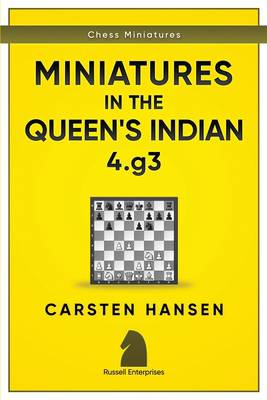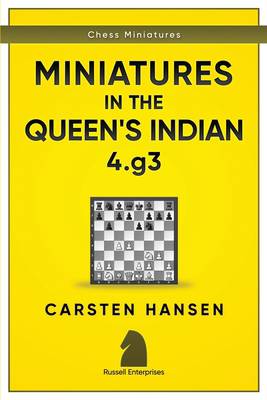
- Retrait gratuit dans votre magasin Club
- 7.000.000 titres dans notre catalogue
- Payer en toute sécurité
- Toujours un magasin près de chez vous
- Retrait gratuit dans votre magasin Club
- 7.000.000 titres dans notre catalogue
- Payer en toute sécurité
- Toujours un magasin près de chez vous
Description
Instructive Miniatures in the Queen's Indian Defense - Spice up your chess opening repertoire and sharpen your chess tactics
The subject of this book is the Fianchetto Variation of the Queen's Indian Defense, which arises after 1.d4 Nf6 2.c4 e6 3.Nf3 b6 4.g3.
Its purpose is to entertain and educate you. The entertainment consists of 100 main games all of which are 25 moves or less. In addition to the main games, you will find miniatures included in the notes, along with many other complete games. The education part involves solving tactical puzzles, reasoning your way to the right move, spotting combinations and studying the theory associated with these lines.
While the theoretical coverage may not necessarily be as deep as in opening monographs or repertoire books, there's usually more than enough to give you a good understanding of the particular line, making it easier for you to incorporate it into your opening repertoire. We have also tried to include some key alternatives with analysis to give you an idea of other possibilities for both sides. As for the games, they are typically between players with a rating of at least 2350 and in fact are often stronger.
The Queen's Indian as a whole has been played consistently since its invention by Aron Nimzowitsch in the early years of the 20th century and it remains a very popular opening at all levels. While its foundation is solid, things can quickly become very sharp and heavy on theory, particularly when Black plays 4...Ba6. We hope you enjoy this second volume in the "Miniatures" series... "Every chess player dreams of winning quickly and beautifully in his favorite opening. Carsten Hansen's new "Miniatures" Series shows you how to do that, divided by opening! A novel and entertaining approach. But as they say - wait, there is more! It's in the nature of chess that miniatures can only be won following mistakes by the opponent. The books can also show you which early mistakes to avoid so that you don't lose quickly and beautifully in your favorite opening. Get the volumes with your openings and use them as preparation for your next tournament!" - Grandmaster Lars Bo Hansen
Needless to say, it has been played a few times since and remains a popular opening at all levels of play.
Some of the lines are incredibly theoretical, but rather than burden you with a ton of theory in lines you will have limited chance of using in your own games, the emphasis is on the lines that are more likely to occur in your games. Those lines will be in chapters 3 and 4, the two longest chapters of the book.
This book is by no means an all-encompassing theory work, which means that there is a lot of theory that is not discussed in the notes. This is of course intentional. The book is written to entertain and inspire. If you find some lines that you like, you are encouraged to dive deeper into those lines before using them in your own games.
As for the games, they are typically between players with a rating of at least 2350 and often well more than that; you will find games between players rated above 2700 in this book.
The book will serve equally well for the chess instructor who wants to illustrate a tactical theme, those who want inspiration for the own opening repertoire as well as those who just want some enjoyable entertainment.
Spécifications
Parties prenantes
- Auteur(s) :
- Editeur:
Contenu
- Nombre de pages :
- 320
- Langue:
- Anglais
- Collection :
- Tome:
- n° 2
Caractéristiques
- EAN:
- 9781973228868
- Date de parution :
- 23-11-17
- Format:
- Livre broché
- Format numérique:
- Trade paperback (VS)
- Dimensions :
- 152 mm x 229 mm
- Poids :
- 471 g







